| Srl | Item |
| 1 |
ID:
076731
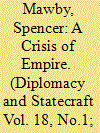

|
|
|
|
|
| Publication |
2007.
|
| Summary/Abstract |
The crises which accompanied the rise and decline of the European empires have not been the object of systematic study in the manner of superpower crises of the Cold War period. Many of the techniques used to study Cold War crises have broader scope, including the models of governmental politics and organisational process developed by Graham Allison. The application of the Allison models to the events surrounding the delimitation of the Aden frontier between 1901 and 1905 illuminates significant aspects of the Anglo-Ottoman confrontation: they explain the manner in which non-rational elements in the policy-making process transformed a relatively insignificant issue into a crisis situation. Such insights also require a detailed examination of the documentary record which in this instance reveals the discord amongst British policy-makers and the organisational imperfections of the bureaucracy. The frontier Commissioners, the Aden Resident, the Government of India, the metropolitan government in London and the embassy in Constantinople were involved in a series of factional squabbles over the Aden frontier, the resolution of which often required the coercion of the Ottomans by the deployment of warships along the Yemen coast. Coordination amongst these different elements in the bureaucracy also played a role in generating tensions between London and Constantinople. The case of the Anglo-Ottoman dispute over the Aden frontier suggests that the analysis of internal governmental politics and organisational processes can be applied successfully to crises of empire which predate the Cold War era.
|
|
|
|
|
|
|
|
|
|
|
|
|
|
|
|
| 2 |
ID:
191104
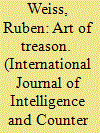

|
|
|
|
|
| Summary/Abstract |
This article seeks to examine the double agent from a literary perspective, focusing on how two spy novels set during the Cold War era—Tinker Tailor Soldier Spy (1974) by John le Carré and The Untouchable (1997) by John Banville—associate the double agent with the world of art. In spy novels set during the Cold War era, using the art world as a setting can provide a divided sense of self and the double agent’s struggle toward inner completeness. Ultimately, this struggle ends in failure.
|
|
|
|
|
|
|
|
|
|
|
|
|
|
|
|
| 3 |
ID:
050607
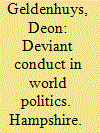

|
|
|
|
|
| Publication |
Hampshire, Palgrave Macmillan, 2004.
|
| Description |
x, 441p.Hbk
|
| Standard Number |
1403932476
|
|
|
|
|
|
|
|
|
|
|
|
Copies: C:1/I:0,R:0,Q:0
Circulation
| Accession# | Call# | Current Location | Status | Policy | Location |
| 047736 | 909.83/GEL 047736 | Main | On Shelf | General | |
|
|
|
|
| 4 |
ID:
103849
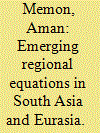

|
|
|
| 5 |
ID:
109112
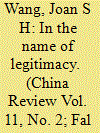

|
|
|
| 6 |
ID:
105846
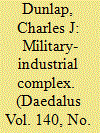

|
|
|
| 7 |
ID:
132394
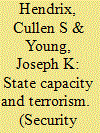

|
|
|
|
|
| Publication |
2014.
|
| Summary/Abstract |
Conventional wisdom suggests that dissident groups use terrorism when they face an overwhelmingly more powerful state, yet attacks in developing countries have predominated in the post-Cold War era, suggesting that terrorism is an increasingly weak state phenomenon. Cross-national studies of terrorism find mixed results for how common measures of state capacity influence terrorism. We argue that these indeterminate findings are due in part to a partial understanding of both what constitutes state capacity and how different aspects of state strength or weakness relate to the propensity of groups to use terrorism. We decompose state capacity into two dimensions that we theorize are particularly relevant to dissident groups: military capacity, or the ability to project conventional military force, and bureaucratic/administrative capacity. Our analysis supports the claim that terrorist attacks are more frequently targeted at states with large, technologically sophisticated militaries but less frequently targeted at states with higher bureaucratic and administrative capacity. We also compare two militarily capable states, France and Russia, that have had different recent experiences with terrorism to help illustrate the causal mechanisms involved. Evidence from our models and cases suggest that states can be capable in different ways, and these various capabilities create differing incentives for using terror as a strategic and tactical tool.
|
|
|
|
|
|
|
|
|
|
|
|
|
|
|
|
| 8 |
ID:
131780
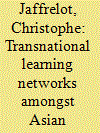

|
|
|
|
|
| Publication |
2014.
|
| Summary/Abstract |
The students of transnational flows, including James Rosenau,1 have pertinently highlighted the growing assertion of 'sovereign free actors' at the expense of 'sovereign bound actors' in what they call postinternational politics.2 Dealing mostly with the end of the Cold War era, they have tended to focus on the increasingly important role of not only the multinational firms but also of the financial companies on newly globalized markets, and not only law-abiding but also illicit traffickers (of drugs, arms etc.) which have prospered along with increasingly more effective means of communication.
They have almost completely ignored the transnationalization of religions, except from the point of view of fundamentalisms and related terrorist networks. Sociologists have paid more attention to this development.3 But these studies, which have mostly focused on the impact of migrations,4 have tended to under estimate the resilience of state boundaries5 and have often neglected the circulation of ideas, especially from the point of view of the learning networks-the very object of this Special Issue which concentrates on one particular creed: Islam.
|
|
|
|
|
|
|
|
|
|
|
|
|
|
|
|